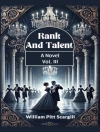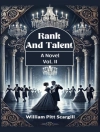Set against the backdrop of the Stuart Restoration, George Bernard Shaw’s ’In Good King Charles’s Golden Days’ is a masterful exploration of political ideals and moral philosophy. Through sharp dialogues and complex characterizations, Shaw delves into the tensions between royal authority and democratic aspirations, portraying the historical figure of King Charles II with a blend of both reverence and critique. The play expertly marries anachronism with contemporary ideological concerns, allowing readers to engage with the timeless struggle for power and the responsibilities that accompany it, all delivered in Shaw’s trademark wit and incisive humor. George Bernard Shaw, a prominent figure in the world of British theater and a key contributor to the social commentary of his time, often challenged prevailing views on politics, art, and society. His experience as a socialist playwright and critic reflects a deep engagement with the issues of governance and personal agency. Shaw’s fascination with historical figures can be traced to his desire to illuminate contemporary dilemmas through the lens of the past, thus informing his distinctive narrative style and thematic choices in this particular work. For readers inclined towards insightful historical drama laced with humor and philosophical inquiry, ’In Good King Charles’s Golden Days’ is a compelling choice. Shaw’s ability to weave complex themes into an entertaining narrative makes this play not only a significant work in the canon of English literature but also a thought-provoking commentary relevant to modern readers.
Om författaren
George Bernard Shaw (1856-1950), a leading figure in the world of literature and a pivotal voice in English-language theatre, was a playwright, critic, polemicist, and political activist. Shaw penned more than sixty plays during his prolific career, enveloping a wide range of themes including social issues, education, class privilege, and the follies of war. His distinctive contribution to drama is marked by his use of both contemporary satire and historical allegory, as exhibited in his play ’In Good King Charles’s Golden Days’ (1939). This particular work, a conversational piece set in the time of Charles II of England, exemplifies Shaw’s ability to weave philosophical discussions with a historical backdrop, thereby delivering his socio-political commentaries amid swift, dialectic wit. A Nobel laureate in Literature (1925) and an Oscar winner for the screenplay adaptation of ’Pygmalion’ (1938), Shaw’s literary style is synonymous with what came to be known as Shavian: intellectually rigorous, satirically humorous, and always challenging societal norms. His powerful and enduring works, such as ’Man and Superman’ (1902), ’Major Barbara’ (1905), and ’Saint Joan’ (1923), have cemented Shaw’s reputation as a master playwright whose works transcend his own Victorian and Edwardian eras to remain relevant and thought-provoking to this day.












